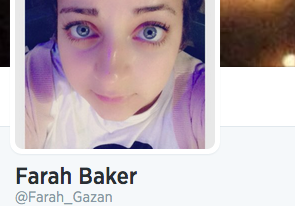Oh I can hear gunshots now #GazaUnderAttack— Farah Baker (@Farah_Gazan) August 9, 2014
Social networking has had a significant impact on numerous aspects of the world today, from personal relationships to professional advertisement. This influence has most recently been displayed during the current conflict in Gaza, as Twitter has become the bullhorn for a young Palestinian girl from Gaza City who has witnessed the Israeli attacks on her hometown.
Farah Baker, a 16-year-old girl who uses the handle @Farah_Gazan, has been live-tweeting about her life since the region was invaded by Israeli troops on July 8. With constant updates using not only text but also photo, video, and audio, she has been tweeting to over 200,000 followers and using retweets to convey news and photographs of the situation between Israel and Hamas, the Palestinian militant group currently involved in the conflict.
Using the hashtags #Gaza and #GazaUnderAttack, Baker tweeted, “This is in my area. I can’t stop crying. I might die tonight,” while experiencing bombing on July 28th. In another tweet from the same day, she said, “They are bombing heavily in my area. This is the worst night in this war. I just want you to know that I might martyr at any moment.”
![Gaza resident Farah Baker is embracing her reputation as "the modern Anne Frank." [Twitter/@Farah_Gazan]](http://www.jstudentboard.com/reporter/wp-content/uploads/2014/08/Screen-Shot-2014-08-13-at-5.15.40-PM-243x300.png)
In an interview with Reuters, Nigel Inkster, former deputy chief of Britain’s Secret Intelligence Service, MI6, and current head of transnational threats at the International Institute for Strategic Studies, said, “It is clear that [social media] analysis can provide an unprecedentedly granular picture of events on the ground that potentially makes a huge difference.”
Baker, despite her young age and vulnerable position, has become a source of commentary and constant updates of the actions committed by the Israeli government.
Notes of her terror during the attacks have spread through Twitter and led to interviews with media organizations. In an interview with CNN, she stated, “This is the first war for me to feel unsafe because in the past two wars I was sure that I won’t be bombed because I’m an innocent civilian… so I all the time feel unsafe because I can be bombed any moment.”
Called “Gaza’s Anne Frank” by some, Baker’s tweets and acknowledgment of her emotions during the attacks make the situation strikingly personal for readers across the world. Twitter user @sebacho1991 tweeted, “the young Farah renamed as Ana Frank de Gaza! i follow and read you from Colombia.”
“Social media has become a massive outlet for individuals to communicate their thoughts with others,” said Aimiel Casillan, a senior at Valencia High School, to JSR.
“@Farah_Gazan is no exception,” she continued. “Living in America, I feel that local news channels cover minimal to no information regarding the violent events in Palestine…[but a] sixteen year old Gazan’s tweets are freely accessible to those who receive such little coverage. I feel that the events become more personal and easier to understand through her eyes, especially [considering that] she is a Palestine native.”

